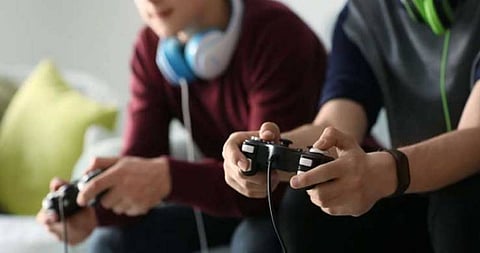
- Home
- Live Blog
- Breaking News
- Top Headlines
- Cities
- NE News
- Sentinel Media
- Sports
- Education
- Jobs

Beijing: Long-term experience of action real-time strategy games such as World of Warcraft, Age of Empires, and Total War can cause long-term changes in the brain and leads to improvements in temporal visual selective attention, according to a study.
These games, which can be won through strategic planning, selective attention, sensorimotor skills, and teamwork place considerable demands on the brain.
Published in the journal, Frontiers in Human Neuroscience, the study shows that expert players of real-time strategy games have faster information processing, allocate more cognitive power to individual visual stimuli and allocate limited cognitive resources between successive stimuli more effectively through time.
“Our aim was to evaluate the long-term effect of experience with action real-time strategy games on temporal visual selective attention,” said study researcher Diankun Gong from University of Electronic Science and Technology of China.
“In particular, we wanted to reveal the time course of cognitive processes during the attentional blink task, a typical task used by neuroscientists to study visual selective attention,” Gong added. To study the effect of gaming on temporal visual selective attention, the research team selected 38 volunteers, healthy young male students.
Half of the volunteers were expert players of the typical action real-time strategy game League of Legend, where teammates work together to destroy the towers of an opposing team.
They had played the game for at least two years and were masters, based on their ranking among the top seven per cent of players. The others were beginners, with less than six months experience of the same game, and ranked among the bottom 30-45 per cent.
All volunteers were seated in front of a screen and tested in a blink task, with 480 trials over a period of approximately two hours.
The greater a volunteer’s tendency to “blink” targets, the less frequently he would press the correct button when one of the two targets appeared on the screen, and the worse he did overall in the task. The volunteers also wore EEG electrodes on the parietal (i.e. sides and top) region of their scalp, allowing the researchers to measure and localise the brain’s activity throughout the experiment.
“We found that expert League of Legend players outperformed beginners in the task. The experts were less prone to the blink effect, detecting targets more accurately and faster, and as shown by their stronger P3b (positive-going amplitude), gave more attentional cognitive resources to each target,” said study co-author Weiyi Ma from the University of Arkansas in the US. (IANS)